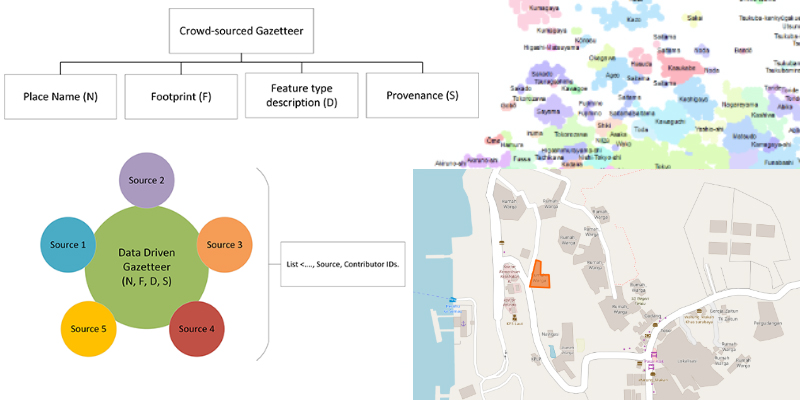Cross-reference between Global Gazetteers, Point of Interests from OSM and Authoritative Data
 Crowd-sourced gazetteer
Crowd-sourced gazetteerObjective:
Keywords:
Description:
A National Mapping Agency (NMA) as a public or government organization has responsibility for the production of topographic maps and national gazetteers of the entire territory of a country. Global gazetteer such as Geonames and the National Geospatial-Intelligence Agency (NGA) GEOnet Names Server (GNS) provide a global coverage of place names database [1, 2]. Core elements of digital gazetteers are names (N), footprint (F), and feature type categories/ descriptions (D) [3, 4].
Data from volunteered or collaborative mapping such as Open Street Map (OSM) give potential place names database for roads or building names [5]. Authoritative data collected by NMA can provide advance dataset at the national or local level for certain regions and medium-large scale topographic map. Crowdsourcing place names is an important issue in several mapping agencies or geographical naming authorities in many countries. Ordnance Survey (OS) develop GB1900 (http://www.gb1900.org) as collaborative historic OS project to enrich and unlocking geographical knowledge of the names of places [6]. Despite the importance of crowdsourcing place names, there is much less information on cross-reference place names information from multiple sources.
Task and expected results:
- examine the characteristic of global gazetteers, OSM and authoritative data.
- assessment the accuracy of gazetteers: availability, scope, completeness, currency, accuracy, granularity, balance and richness of annotation [7].
- cross-referencing conducted based on the core elements of gazetteers.
- methods and tools to analyze and cross-reference variables in the dataset of gazetteers.
[1] Acheson, E., De Sabbata, S., & Purves, R. S. (2017). A quantitative analysis of global gazetteers: Patterns of coverage for common feature types. Computers, Environment and Urban Systems, 64, 309–320. https://doi.org/10.1016/j.compenvurbsys.2017.03.007
[2] Ahlers, D. (2013). Assessment of the accuracy of GeoNames gazetteer data. In Proceedings of the 7th Workshop on Geographic Information Retrieval - GIR ’13 (pp. 74–81). New York, New York, USA: ACM Press. https://doi.org/10.1145/2533888.2533938
[3] Hill, L. L. (2000). Core Elements of Digital Gazetteers: Placenames, Categories, and Footprints. In Research and Advanced Technology for Digital Libraries (pp. 280–290). https://doi.org/10.1007/3-540-45268-0_26
[4] Gao, S., Li, L., Li, W., Janowicz, K., & Zhang, Y. (2017). Constructing gazetteers from volunteered Big Geo-Data based on Hadoop. Computers, Environment and Urban Systems, 61, 172–186. https://doi.org/10.1016/j.compenvurbsys.2014.02.004
[5] Touya, G., Antoniou, V., Olteanu-Raimond, A.-M., & Van Damme, M.-D. (2017). Assessing Crowdsourced POI Quality: Combining Methods Based on Reference Data, History, and Spatial Relations. ISPRS International
[6] Southall, H., Aucott, P., Fleet, C., Pert, T., & Stoner, M. (2017). GB1900: Engaging the Public in Very Large Scale Gazetteer Construction from the Ordnance Survey “County Series” 1:10,560 Mapping of Great Britain. Journal of Map and Geography Libraries, 13(1), 7–28. https://doi.org/10.1080/15420353.2017.1307305
[7] Hill, L. L. (2006). Georeferencing : the geographic associations of information. MIT Press.
References:
Hill, L. L. (2000). Core Elements of Digital Gazetteers: Placenames, Categories, and Footprints. In Research and Advanced Technology for Digital Libraries (pp. 280–290). https://doi.org/10.1007/3-540-45268-0_26
Hill, L. L. (2006). Georeferencing : the geographic associations of information. MIT Press.
Gao, S., Li, L., Li, W., Janowicz, K., & Zhang, Y. (2017). Constructing gazetteers from volunteered Big Geo-Data based on Hadoop. Computers, Environment and Urban Systems, 61, 172–186. https://doi.org/10.1016/j.compenvurbsys.2014.02.004

